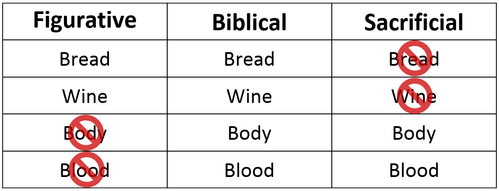Read Matthew 26:26-28
Christians are divided on the meal intended to unite us. Some read, "This is my body" and "This is my blood", and conclude Jesus is speaking figuratively. They reason only bread and wine are evident and/or the idea of receiving body and blood offends their sensibilities. Therefore, many question any talk of body and blood and speak of eating bread and wine only as an act of remembrance.
A more literal view reasons that Jesus' words cause the bread and wine to trans-substantiate to move from being one substance to another. They philosophize that the bread and wine change into the body and blood of Jesus and are sacrificed at every mass.
Christians are divided on the meal intended to unite us. Some read, "This is my body" and "This is my blood", and conclude Jesus is speaking figuratively. They reason only bread and wine are evident and/or the idea of receiving body and blood offends their sensibilities. Therefore, many question any talk of body and blood and speak of eating bread and wine only as an act of remembrance.
A more literal view reasons that Jesus' words cause the bread and wine to trans-substantiate to move from being one substance to another. They philosophize that the bread and wine change into the body and blood of Jesus and are sacrificed at every mass.

God’s Word simply says Jesus took bread and wine and, with it, offered His body and blood for the forgiveness of sins. The Bible doesn’t explain how participants in this meal receive the body and blood of Jesus. Nor does the Bible language allow for this meal to be described as a mere symbol. After all, the apostle Paul even asserts Christ’s real presence in the Lord’s Supper (1 Corinthians 10:14‐22).
We need to resist the original temptation here too and trust God’s gracious Word. We receive what Jesus said.
We need to resist the original temptation here too and trust God’s gracious Word. We receive what Jesus said.
